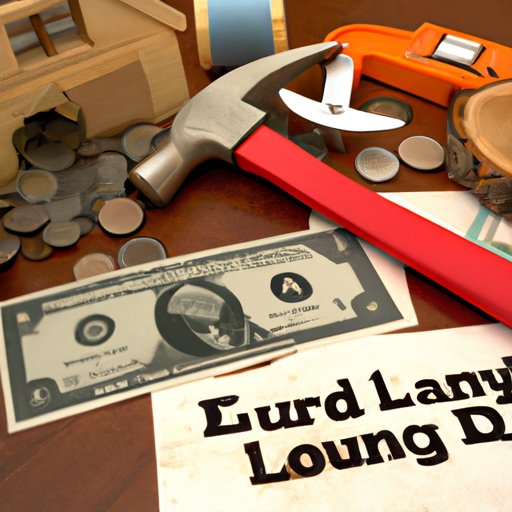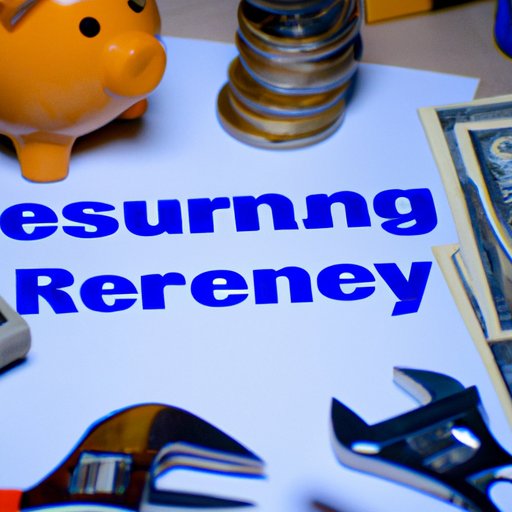Introduction
Home renovations can be a great way to add value to your property and make it more enjoyable to live in. Whether you’re looking to update an outdated kitchen or add an extra bedroom, there are many ways to finance your home renovation project. In this article, we’ll explore the different options available to help you decide which one is right for you.
Overview of Home Renovations
Home renovations involve making changes to the structure or features of your house, such as adding new rooms, remodeling existing rooms, or installing new fixtures and appliances. Renovations can also include replacing old windows, doors, and other elements of the exterior, as well as landscaping and other outdoor improvements. The cost of these projects can vary significantly depending on the size and scope of the work.

Challenges of Financing Home Renovations
Financing home renovations can be challenging because the costs can quickly add up. In addition, the cost of materials and labor can vary widely depending on the type of project and the area where you live. It’s important to take into account all of these factors when considering how to finance your home renovation project.
Budgeting for Home Renovations
The first step in financing your home renovation project is to create a budget. This will help you determine how much money you need to complete the project and how you plan to pay for it. Here are some tips for creating a realistic budget for your home renovation project:
Calculating the Cost of Your Project
When creating your budget, it’s important to calculate the total cost of the project. Start by researching the materials and labor costs for the work that needs to be done. Make sure to include any additional fees, such as permits or contractor fees, in your calculations.
Estimating Time and Labor Costs
In addition to the cost of materials, you should also factor in the time and labor costs associated with the project. This includes the cost of hiring contractors or other professionals to complete the work. Be sure to research local rates and get quotes from several contractors before deciding who to hire.
Setting a Realistic Budget
Once you have calculated the total cost of the project, it’s important to set a realistic budget. Consider how much you can afford to spend and try to stay within your means. It’s also a good idea to set aside a portion of your budget for unexpected expenses that may arise during the project.
Home Renovation Loans
One option for financing your home renovation project is to take out a loan. Home renovation loans are designed to help homeowners cover the cost of their projects, and they come in a variety of forms. Here’s what you need to know about home renovation loans:
Types of Home Renovation Loans
There are several types of home renovation loans available, including personal loans, home equity loans, and government-backed loans. Each type of loan has its own requirements and terms, so it’s important to do your research to find the one that best suits your needs.
Qualifying for a Home Renovation Loan
In order to qualify for a home renovation loan, you typically need to meet certain financial criteria. This can include having a good credit score, a steady income, and sufficient equity in your home. Make sure to check with your lender to see if you meet their requirements.
Advantages of Home Renovation Loans
Home renovation loans offer a number of advantages, including low interest rates and flexible repayment terms. They also allow you to borrow larger amounts of money than you would be able to with a personal loan. Additionally, many lenders offer special incentives and discounts for home renovation projects.

Home Equity Loans and Home Improvements
Home equity loans are another popular option for financing home renovations. Home equity is the difference between the value of your home and the amount you owe on it. If you have enough equity in your home, you can use it to finance your home improvement project.
Understanding Home Equity
Before taking out a home equity loan, it’s important to understand how home equity works. Generally speaking, the more equity you have in your home, the more money you can borrow. Your lender will evaluate your home’s value and assess the amount of equity you have in it.
Benefits of Using Home Equity to Finance Home Improvements
One of the main benefits of using home equity to finance home improvements is that it can allow you to borrow larger amounts of money. Additionally, the interest rate on a home equity loan is typically lower than on other types of loans. Finally, the interest payments on a home equity loan may be tax deductible.
Risks of Home Equity Loans
Although home equity loans can be a useful way to finance home improvements, they also come with certain risks. For example, if you fail to make your payments, you could lose your home. Additionally, if the value of your home decreases, you could end up owing more money than your home is worth.
Savings vs. Borrowing
Another option for financing your home renovation project is to use your own savings. This can be a good option if you have enough money saved up to cover the cost of the project. However, if you don’t have enough money saved, you may need to consider borrowing money to finance your renovation.
Benefits of Paying for Home Renovations with Savings
One of the main benefits of paying for home renovations with savings is that you won’t have to deal with any of the risks associated with borrowing money. Additionally, you won’t have to worry about making payments or accruing interest. Finally, using your own money to finance your renovation can be a good way to stay within your budget.
Pros and Cons of Borrowing Money for Home Renovations
Borrowing money for home renovations can be a good option if you don’t have enough money saved. However, it’s important to weigh the pros and cons before taking out a loan. Some of the benefits of borrowing money for home renovations include access to larger sums of money and the potential for tax deductions. On the other hand, some of the risks include high interest rates and the potential for foreclosure if you fail to make your payments.
Home Renovation Financing: Pros and Cons
When it comes to financing your home renovation project, there are a number of different options available. From budgeting and home renovation loans to home equity loans and savings, each option has its own pros and cons. Before deciding which method is right for you, it’s important to compare the different options and consider the risks and benefits of each.
Conclusion
Financing home renovations can be a challenge, but there are a number of options available to help you cover the cost of your project. From budgeting and home renovation loans to home equity loans and savings, each option has its own advantages and disadvantages. Ultimately, the best financing option for you will depend on your individual situation and goals. With careful planning and research, you can find the right solution for your home renovation project.
(Note: Is this article not meeting your expectations? Do you have knowledge or insights to share? Unlock new opportunities and expand your reach by joining our authors team. Click Registration to join us and share your expertise with our readers.)
